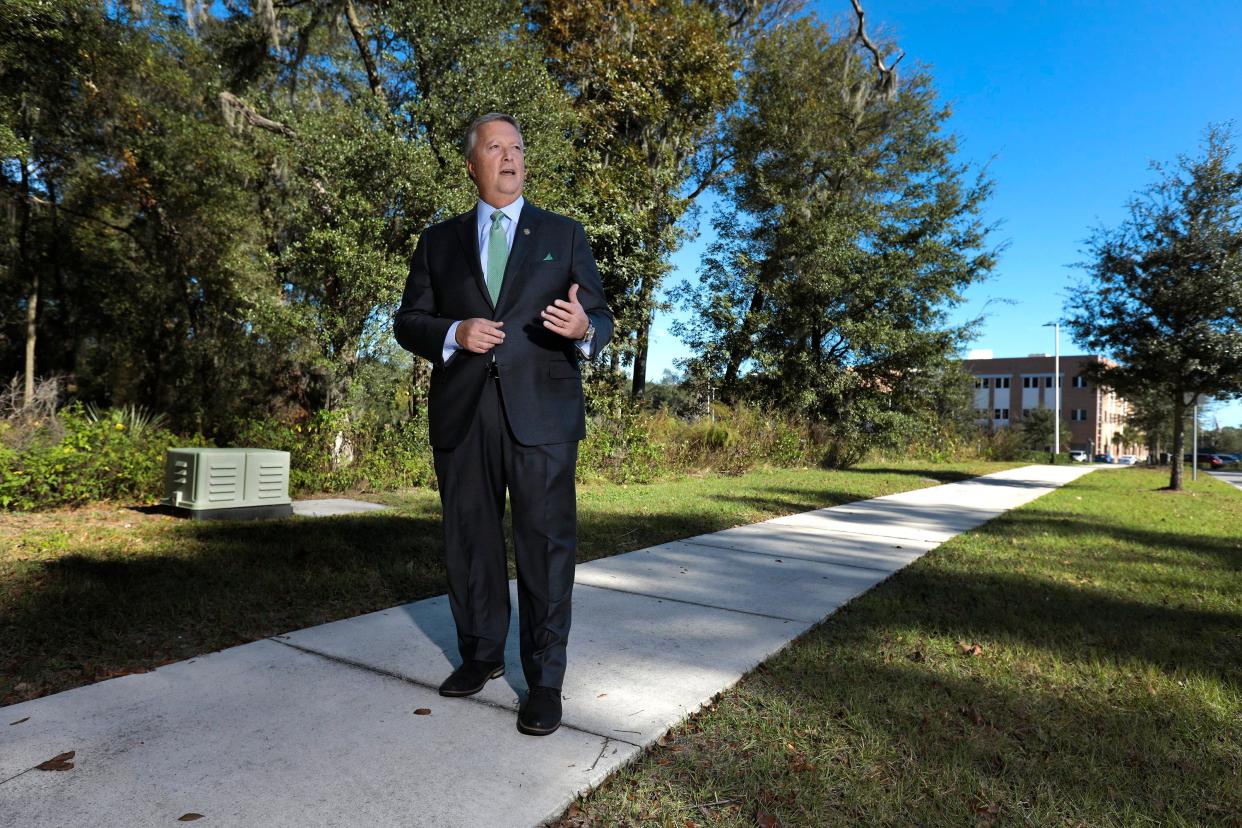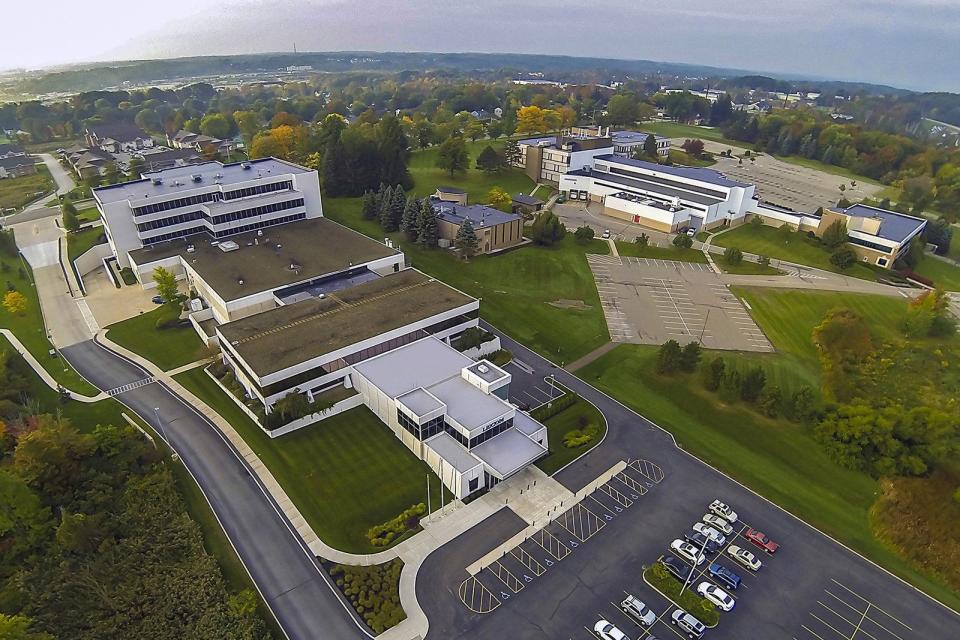Osteopath college aims to open Jacksonville medical school at JU, filling need for doctors

Jacksonville University has partnered with a Pennsylvania-based private college to have a medical school open at the JU campus by 2026, officials from the two schools announced Wednesday.
The agreement allows Lake Erie College of Osteopathic Medicine, the country’s largest medical school, to open “LECOM at Jacksonville University” to train doctors to fill staffing needs fueled by Northeast Florida’s growth and the demographics of an aging health care industry.
“We believe this will help propel our region to the forefront of the world’s healthcare system,” JU President Tim Cost said.
The school at the north end of JU’s Arlington campus is expected to open with 75 students in its first class and grow to 150 students per year by the early 2030s.
Third- and fourth-year students will train under physicians at health systems including Baptist Health, Flagler Health+, and AdventHealth, which have already reached clinical education agreements with LECOM.

Dozens of students from other LECOM campuses already get clinical training at Jacksonville-area healthcare systems including Baptist and Ascension St. Vincent’s, said Travis Smith, a Northeast Florida emergency medicine physician who will be LECOM at JU's first dean.
But he said the number of students will grow markedly after the JU school opens and said that change will help Northeast Florida find homegrown talent to keep its people healthy.
“This is the largest city in the country without a medical school. There’s clearly a need,” said Smith, who has been part of talks about opening a LECOM campus in Jacksonville for more than two years.
As part of the two schools' partnership, JU graduates will receive priority for admission to a certain number of seats in LECOM's osteopathic medicine program or spots in the pharmacy and dental instruction offered at other LECOM campuses, Smith said.
The medical school is expected to be built on private property between the health sciences building and Dolphin Pointe Health Care, a 146-bed skilled nursing and rehabilitation center expected to become a site for sstudent training.
LECOM plans to spend about $50 million developing its Jacksonville facility, and Cost said the project will add people and money that will encourage investment and development in adjacent Arlington neighborhoods.
Cost said activity tied to the project on Dolphin Point Boulevard, from staffing and classroom construction to housing and restaurant and retail growth is expected to eventually support 400 to 600 jobs. The economic impact is estimated at $91.1 million, a JU release said.
No state or city financial incentives are being sought, Smith said.

LECOM latest in JU expansion projects
LECOM, which was founded 30 years ago, will build and manage the medical school independently but operate adjacent to JU classroom and clinic facilities in an area the university has labeled its “medical mall.”
LECOM students will have access to JU facilities including the 104,000-square-foot Health Sciences Complex, used by students in graduate and post-graduate studies in fields ranging from nursing to orthodontics and occupational therapy.
The partnership continues an expansion into new fields by JU, which in August opened a law school downtown.
Having a four-year medical school on campus is “the next natural step” for JU, said Cost, describing a series of incremental moves already taken to expand healthcare education under Provost Christine Sapienza, the former dean of JU’s Brooks Rehabilitation College of Healthcare Sciences.
“We’ve built up a quality portfolio,” said Sapienza. By connecting with LECOM, she said, “we picked a strong partner who is very well known in osteopathic medicine.”
LECOM last fall enrolled about 2,500 students in its doctor of osteopathic medicine (DO) program at campuses in Erie, Pa.; Greensburg, Pa.; Bradenton; and Elmira, N.Y. The college also offers doctoral degrees in dental medicine and pharmacy as well as graduate and post-graduate degrees in several healthcare fields.
In October, the college asked the Commission on Osteopathic College Accreditation to approve a measure that Smith said would treat the JU school as an additional location operating under LECOM’s existing accreditation.
“They’re well-known,” Baptist Health CEO Michael Mayo said of LECOM’s DO training. “… It’s a well-respected program. They have national accreditation.”
The college is also noted for its relatively low cost. Tuition this year is $37,900, while Sapienza said a typical medical school will cost $60,000 to $70,000 for the year. The school has been listed as one of the cheapest medical schools in U.S. News & World Report’s annual rankings.

Mayo said he surveyed Baptist physicians before agreeing to make his organization part of LECOM’s clinical training. Although it requires doctors to commit time to teaching, he said there was a lot of support.
Working with medical students “really raises all boats,” he said. “It enhances everybody’s game. You learn from the students. … While it is a sacrifice, most people look at it as ‘someone trained me’ and they’re willing to do the same.”
Students being trained now could find themselves in huge demand once they’re licensed to practice.
The Association of American Medical Colleges projected last year that by 2034 the United States could need as many as 124,000 more doctors than will be available because of a growing population and physicians aging and retiring. More than 40 percent of active physicians will be 65 or older by the 2030s, creating shortages of both primary-care doctors and specialists, the association said.
A medical school in Jacksonville can help fill that need, LECOM President and CEO John Ferretti said in written remarks.
“Since our inception 30 years ago, LECOM strives to meet the need for highly trained physicians in the markets we serve and throughout the country,” Ferretti said. “Partnering with Jacksonville University to establish our fifth campus will produce doctors and skilled health care workers that will serve northeast Florida and beyond.”
Osteopathic medicine is a discipline whose physicians “combine medical expertise with a whole-person approach focused on listening and partnering with their patients,” the American Osteopathic Association says on its website. Doctors of osteopathic medicine, or DO’s, are trained “to see an interrelated unity among all systems of the body and strive to help patients achieve overall health, not just relief from symptoms,” the association says.
A report from the group this year counted 141,759 osteopathic physicians nationwide, a 31 percent increase from the number five years earlier. They’re licensed in this state by the Florida Board of Osteopathic Medicine.
Although DOs are less numerous than MDs — the Association of American Medical Colleges counted about 620,000 of those in 2019 — the American Medical Association accepts either degree as a credential for membership.
This article originally appeared on Florida Times-Union: Penn. osteopath college plans Jacksonville medical school by JU campus

